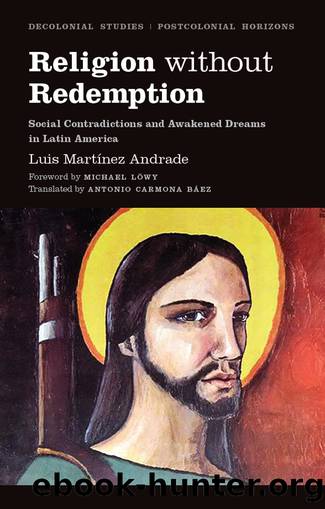Religion Without Redemption by Luis Martínez Andrade;

Author:Luis Martínez, Andrade; [Andrade, Luis Martínez]
Language: eng
Format: epub
ISBN: 3386801
Publisher: Pluto Press
The Word: Between God and Liberation
The violence exercised by the power of imposition on the part of the political-military class and North American consultancy under the National Security Doctrine (Rockefeller Report, 1969; see Cockcroft, 2001), has been documented by various political, social and intellectual actors in order to denounce impunity.54 Memory, as an element of resistance, is fundamental to the strategies of social emancipation. Since it is a social product, memory also contains contradictions (abstract utopias, dreams, fetishised images) that mobilise or encapsulate the historical dynamic.
The role that the Church played in legitimising or confronting the logic of domination has been tackled from different perspectives.55 The political commitment, adopted, and even brought to the level of sacrifice, by some prophetic figures of Latin American Catholicism, represented one of the most beautiful pages of Church history in that region. So, based on Blochâs contributions, we undertake deep hermeneutics in order to trace the presence of the utopic function in the literature of liberation theology. The Principle of Hope, as a âmain drive for a dream aheadâ (Bloch, 1996) can be revealed in the poetry of Ernesto Cardenal and Frei Tito, and in the narratives provided by Frei Betto.
For Bloch, the artisitic appearance as a visible pre-appearance is another configuration of the utopic dynamic. In this sense, resting on Scaliger,56 Bloch maintains that the poet holds the creator spiritus, that creative spirit as a utopic totem which behaves as a subversive demonic element. The poet, thus, is not only the carrier of the spirit of his/her times but also the causing actor in the prefiguration of concrete utopias. That is, a seer of a classless society.
Liberating-prophetic poetry has found one of its great expressions in the work of Ernesto Cardenal.57 This Nicaraguan priest incorporated himself into the Trappist order at Our Lady of Gethsemane in Kentucky, where Thomas Merton58 served as his counsellor. Years later, following a period of illness, he established himself at the Benedictine monastery of Santa MarÃa de la Resurrection in Cuernavaca. It is worth mentioning here that some of the Beat Poets spent time at this monastery. Thereafter, Cardenal studied theology at the Cristo Sarcedote Seminary in Antioquia, Colombia â one of the most progressive institutions of the time â and this is where he became a priest in 1965. Thereafter, he returned to Nicaragua with the intention of establishing a contemplative and self-sufficient community on the island of Solentiname. This would become the meeting place of such intellectuals as Julio Cortázar and José Coronel Ultrecho, among others. During those years he was drawn to Marxism and became involved in the Sandinista Front. Some of the members of the community became leaders in that political organisation.
The Arrival
We get off the plane and we go, Nicaraguans and foreigners,
all mixed together toward the huge lighted building â first stop
Immigration and Customs â and as we approach, passport in hand,
I think of how proud I am to be holding
the passport of my socialist country, and of my satisfaction
at arriving in a Socialist Nicaragua.
Download
This site does not store any files on its server. We only index and link to content provided by other sites. Please contact the content providers to delete copyright contents if any and email us, we'll remove relevant links or contents immediately.
Getting It, Then Getting Along by L. Reynolds Andiric(610)
Global Justice, Christology and Christian Ethics by Lisa Sowle Cahill(387)
Religion and Politics Beyond the Culture Wars : New Directions in a Divided America by Darren Dochuk(386)
Positive Psychology in Christian Perspective: Foundations, Concepts, and Applications by Charles Hackney(324)
Forgiveness and Christian Ethics by Unknown(308)
Douglas Hamp The First Six Days by Unknown(210)
Christian Martyrdom and Christian Violence by Matthew D. Lundberg;(201)
The Oxford Handbook of Greek and Roman Mythography by R. Scott Smith;Stephen M. Trzaskoma;(194)
Beyond Heaven and Earth by Gabriel Levy(188)
God and Eros by Patterson Colin;Sweeney Conor;(187)
The Bloomsbury Reader in Christian-Muslim Relations, 600-1500 by David Thomas;(186)
Insurgency, Counter-insurgency and Policing in Centre-West Mexico, 1926-1929 by Mark Lawrence(184)
The Horrors and Absurdities of Religion by Arthur Schopenhauer(179)
Cult Trip by Anke Richter(172)
Autobiography, Volume 2: 1937-1960, Exile's Odyssey by Mircea Eliade(171)
Witches: the history of a persecution by Nigel Cawthorne(170)
The Myth of Disenchantment by Jason A. Josephson-Storm(156)
An Introduction to Kierkegaard by Peter Vardy(154)
The Believer by Sarah Krasnostein(150)
